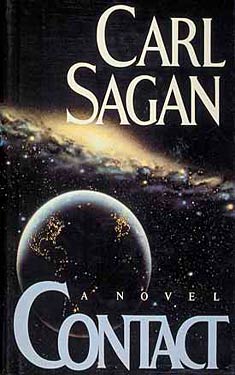Carl Sagan
Completed 11/8/2015, Reviewed 11/10/2015
5 stars
Carl Sagan is one of my childhood heroes. My dad used to wake me up at 1 o’clock in the
morning to watch him when he was the last guest on an episode of the Johnny
Carson show. I read “The Dragons of
Eden” in high school and thought Sagan was genius in making hard science very
understandable. I loved the movie
version of “Contact” but never read it, until now that it’s the December
selection for my book club. And I loved
it.
 Ellie is a brilliant radio astronomer obsessed with search
for extraterrestrial life. When a signal
finally turns up, there is a mad dash to make sense of it. It’s eventually discovered that signal
contains the blue prints for some kind of machine. It appears to be some kind of spaceship, but
no one knows for certain. If they spend
the trillions of dollars to build it, what will they find? Will we finally have contact with aliens?
Ellie is a brilliant radio astronomer obsessed with search
for extraterrestrial life. When a signal
finally turns up, there is a mad dash to make sense of it. It’s eventually discovered that signal
contains the blue prints for some kind of machine. It appears to be some kind of spaceship, but
no one knows for certain. If they spend
the trillions of dollars to build it, what will they find? Will we finally have contact with aliens?
The best thing about this book is that it is very hard
science fiction, but written so it’s quite understandable. I should have expected this from my
experience with “Dragons of Eden”, but it caught me off guard. The explanation of things like prime numbers
and layers of signal read very easily and clearly. I actually had more trouble remembering who
characters were than understanding the science.
There are a lot of featured characters. Sagan does a great job of delving into the
lives of most of them. It adds a great
depth to the characters, fleshing out the different kinds of people that become
scientists. Eventually, I started to get
their histories a bit confused. But I
think the book is really well written.
It’s just a matter of how much different data you can remember.
Another great aspect of the book is that Sagan has a lot of
discussions about religion as well as women in science that are very
provocative. They didn’t surprise me, as
I’ve read his “The Demon-Haunted World” non-fiction work where he discussed
science and religion. I was impressed
with how here he was able to create really good arguments and actually left it
to the reader to draw conclusions on the issues in the context of fiction.
My only complaint with the book was that it lacked a sense
of warmth. The characters, including
Ellie, despite having thorough histories, did not seem to have much emotional
breadth until the end. Granted, we’re
talking about scientists who stereotypically are driven by logic rather than
emotions. I think perhaps I was
picturing the actors from the movie speaking the dialogue, but just wasn’t
getting the humanness that the actors created.
Despite this, I’m still going to give it five stars out of five. I loved reading it, I thought it was well
written. It’s a terrific hard science
novel that conquers important philosophical questions as well, which I think is
very much reminiscent of what Arthur C. Clarke was often able to accomplish in
his novels.
I remember someone getting a copy of this for me for a birthday or Christmas present when I was a teenager and I just couldn't get into it. My experience with hard sf, and reading in general, has changed over those intervening years, and I suspect I would not feel that way today.
ReplyDeleteI think because of that feeling I had about the book all those years ago, I never even bothered to see the film version.
I actually had a copy of this when I was younger as well, but never got around to it. I think the hard SF is parts are pretty clear because Sagan was a really good professor. I think you have to be open to reading what could be thought of as a string of lectures.
Delete